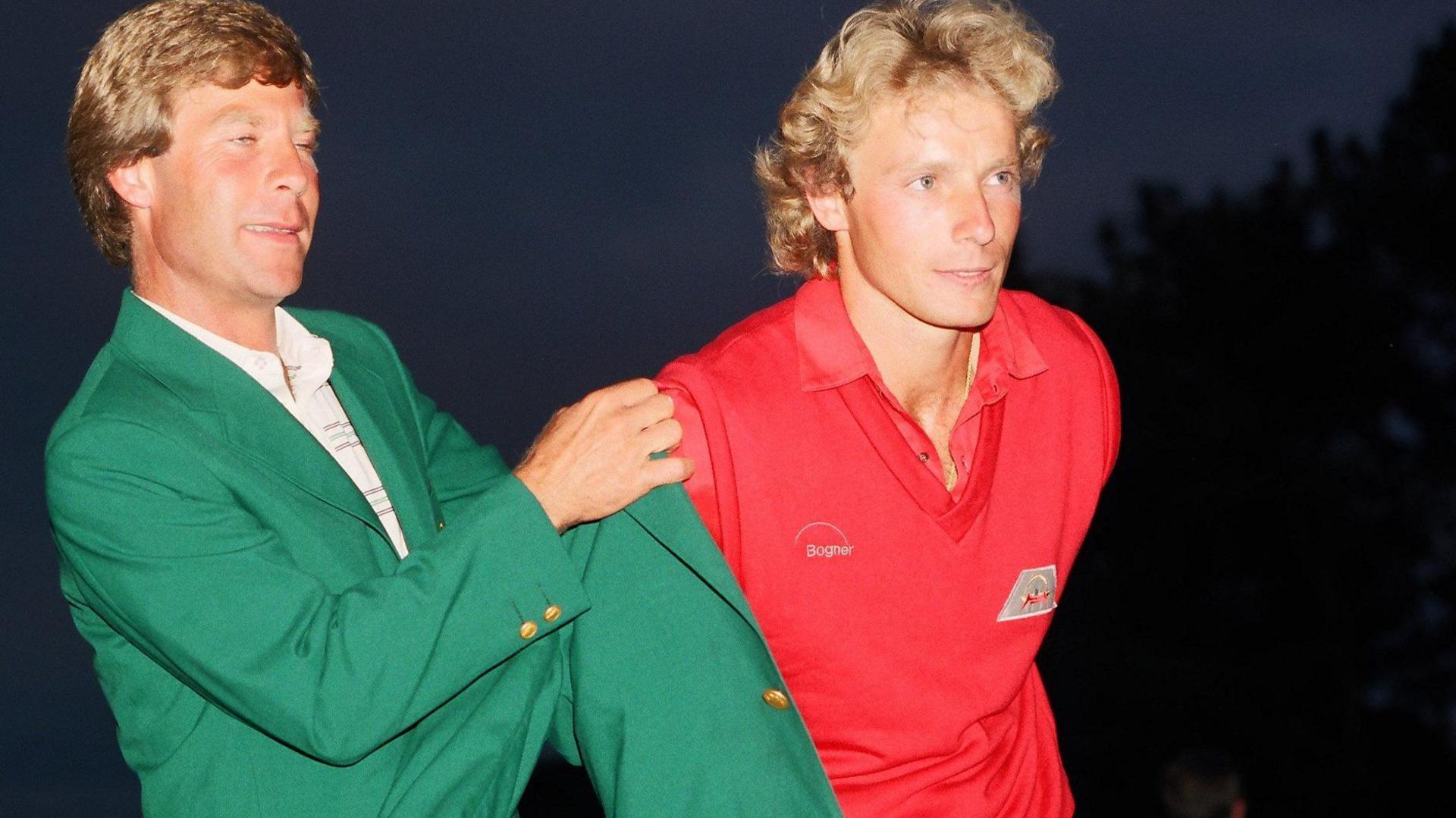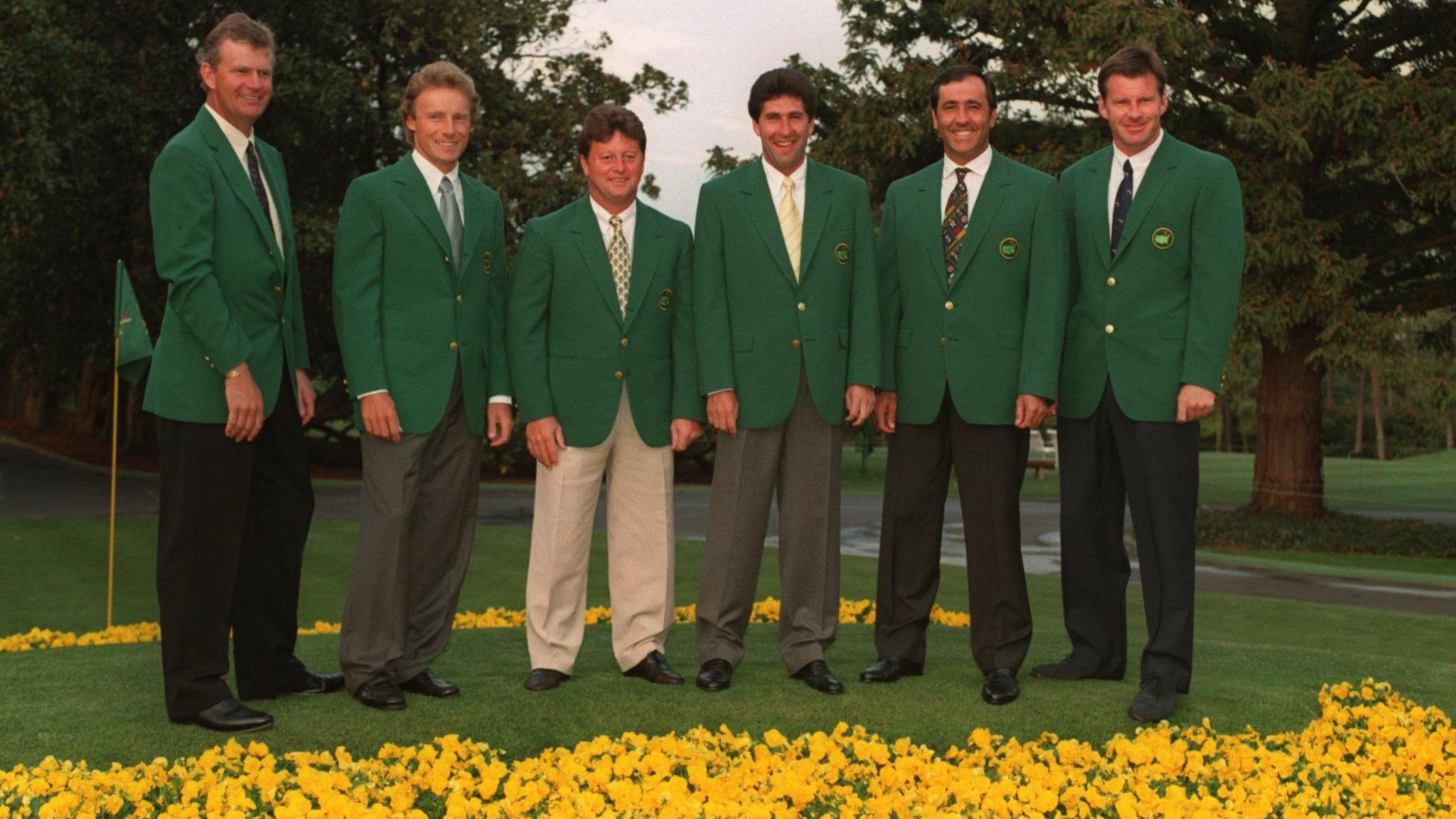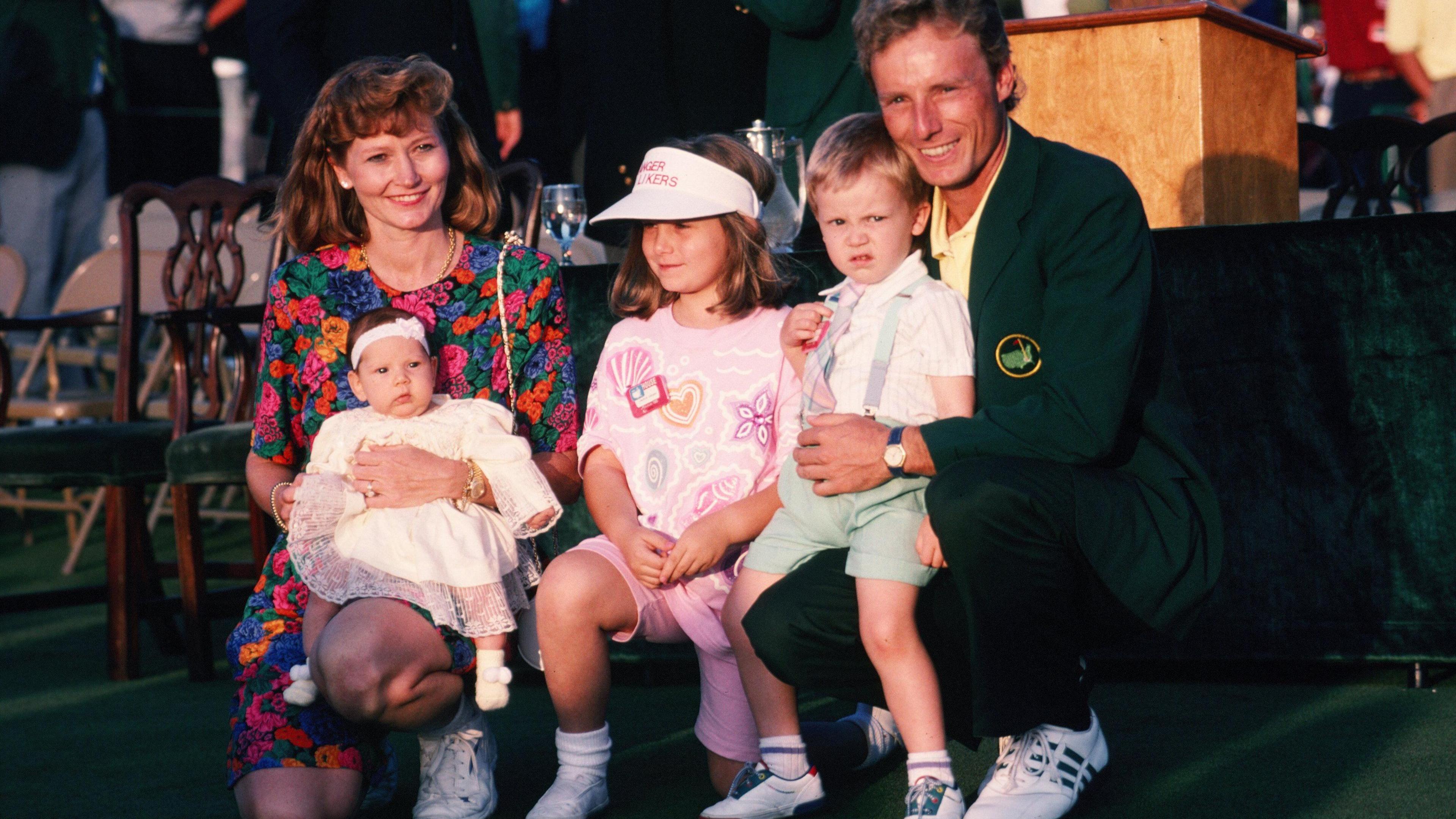Ex-champion Langer braced for 'emotional' Masters farewell

'Red and green should never be seen', apparently - but Bernhard Langer was delighted to pair his red polo shirt with the iconic Green Jacket in 1985
- Published
When Tiger Woods romped to his first Masters title in 1997, he did so wearing a red top that quickly became established as his iconic Sunday colour.
But the American, who would go on to win five times at Augusta National, was not the first to make the fashion faux pas of pairing a red polo shirt with the Green Jacket.
Forty years ago this weekend, Bernhard Langer set the tone as he marched to the first of his two Masters victories - he even wore red trousers, too.
"I always tease Tiger," said the 67-year-old, who was close to tears as he talked about playing in his 41st and final Masters this week.
"See, I was the one wearing a red shirt first; you came later."
Langer has previously joked that he "looked like a Christmas tree" when he donned the famous Green Jacket for the first time in 1985.
'McIlroy's Masters memories must be turned into a positive'
- Published9 April
Cabrera wins on eve of Masters return after time in prison
- Published7 April
'It's time to quit'
His final Masters was supposed to be last year but a snapped Achilles tendon - an injury suffered while playing pickleball - meant the German couldn't play. So he delayed saying farewell to a place that means so much to him.
"They're the two most important wins in my career," he said of his 1985 and 1993 victories at Augusta, which are his sole major triumphs.
"It's emotional. You can tell already my voice is breaking a bit just realising it's going to be my last competitive Masters."
Langer has conceded for many years that he no longer has the game to compete at Augusta; three missed cuts in his past three Masters are testament to that.
"The course is just getting too long and I'm getting shorter and shorter," he said.
"I'm hitting hybrids [into greens] where the other kids are hitting nine-irons, maybe even wedges. So I knew I wasn't going to be in contention anymore.
"A few years back I asked the chairman of the club, 'is there a time limit? Do we age out when we're 60?'. He said, 'no, you will know when it's time to quit, it's totally up to you'.
"It is time to quit."
'The first time was an eye-opener'

Lyle, Langer, Woosnam, Olazabal, Ballesteros and Faldo were victorious at Augusta National in an extraordinary era of success for European golf
Langer was runner-up at The Open twice and third on three occasions in a career that promised more major success.
That he was unable to add a major other than his two at Augusta only intensifies his link to this fabled corner of Georgia.
In 40 appearances, he has made the cut 27 times and finished inside the top 10 nine times.
"It's been an incredible journey, for a young man born in a village of 800 people [in Bavaria, southern Germany], where golf was nothing, to make it here," he said.
"To get an invitation to play the Masters when it was extremely difficult for European or international players to get one, and then to win the Masters on the third go was just a dream come true."
He was just the third non-American winner, following in the footsteps of South Africa's three-time champion Gary Player and Seve Ballesteros of Spain, who won twice.
His win cemented belief among Europeans that success could be achieved at Augusta.
Ballesteros paved the way with his victories in 1980 and 1983, before Langer won his first two years later.
Then Scotland's Sandy Lyle, England's Nick Faldo (twice) Wales' Ian Woosnam, Langer again and Spain's Jose Maria Olazabal collected six of seven titles from 1988.
Langer's debut was in 1982, two years after Ballesteros had broken the glass ceiling.
The German's initial experience was hardly noteworthy. He shot 77 and 78 to miss the halfway cut by one stroke after three-putting 11 times in 36 holes on unfamiliar greens that were too slick for a naive 24-year-old.
"Coming here the first time, driving down Magnolia Lane, seeing this place for the first time was an eye-opener," he said.
"I had never seen a golf course manicured like this or a tournament run as efficiently as this has been."
Career-defining victories

By the time Langer won his second title in 1993, he was married with three children
He vowed to come back better prepared and when he returned two years later he made it through to the weekend - the first of an incredible run of 19 successive Masters that Langer would play all four rounds.
His victory 12 months later was secured with a classic back-nine Augusta charge. He birdied four out of six holes from the 12th as he overturned a three-shot deficit to Curtis Strange, who dropped shots on three of his final five holes.
Langer bogeyed the 18th but still beat Strange, Ray Floyd and his playing partner Ballesteros by two shots.
He made a solid defence of his title in 1986 and briefly shared the lead in the final round before Jack Nicklaus produced a back nine for the ages to clinch his record-extending sixth Green Jacket and 18th major title.
That week was also memorable for witnessing the first time a world ranking was published, and it was Langer who had the honour of topping the inaugural list.
He was becoming something of an Augusta specialist and the love affair strengthened with two more top 10s before he claimed his second victory in 1993.
Langer was challenged by unheralded American Dan Forsman in the final round.
Forsman was one shot behind the German when he teed off on the notoriously tricky par-three 12th. He dumped two balls in the water, walked off with a quadruple-bogey seven and was barely heard of again.
In contrast, Langer's name continued to pepper the leaderboards at Augusta, with top 10s in 1997, 2001 and 2004.
He finished joint eighth at the age of 56 in 2014 and held the record for the oldest player to make the cut - at the age of 63 in 2020 - until Fred Couples eclipsed that in 2023.
'I'm expecting it to be emotional'
This is Langer's final Masters but not the end of competitive golf for the former Ryder Cup captain, who looks as fit as he did in his pomp.
He shows no signs of slowing down on the PGA Tour Champions - the US-based seniors tour - and has racked up at least one victory a year since joining the circuit in 2007 when he turned 50.
He has won 12 majors among 47 senior victories - both of which are records.
This week he is back among the game's youthful elite though, and will seek to end his Masters career with the same controlled elegance with which he has played throughout his career.
He will not contend for the title. That is clear. Instead, the question is whether his Masters career ends after round two on Friday, or if he defies his own expectations and makes the cut.
"After four decades it's going to be bittersweet," he said.
"When I'm inside the ropes, my mind switches to being a competitor, play golf and take care of the task in front of me.
"But I might get a bit emotional looking around, seeing my family, my kids, my grandkids, my brother and other friends that are going to be supporting me this week.
"I love the Masters more than any tournament in the world. I'm expecting it to be very difficult emotionally."